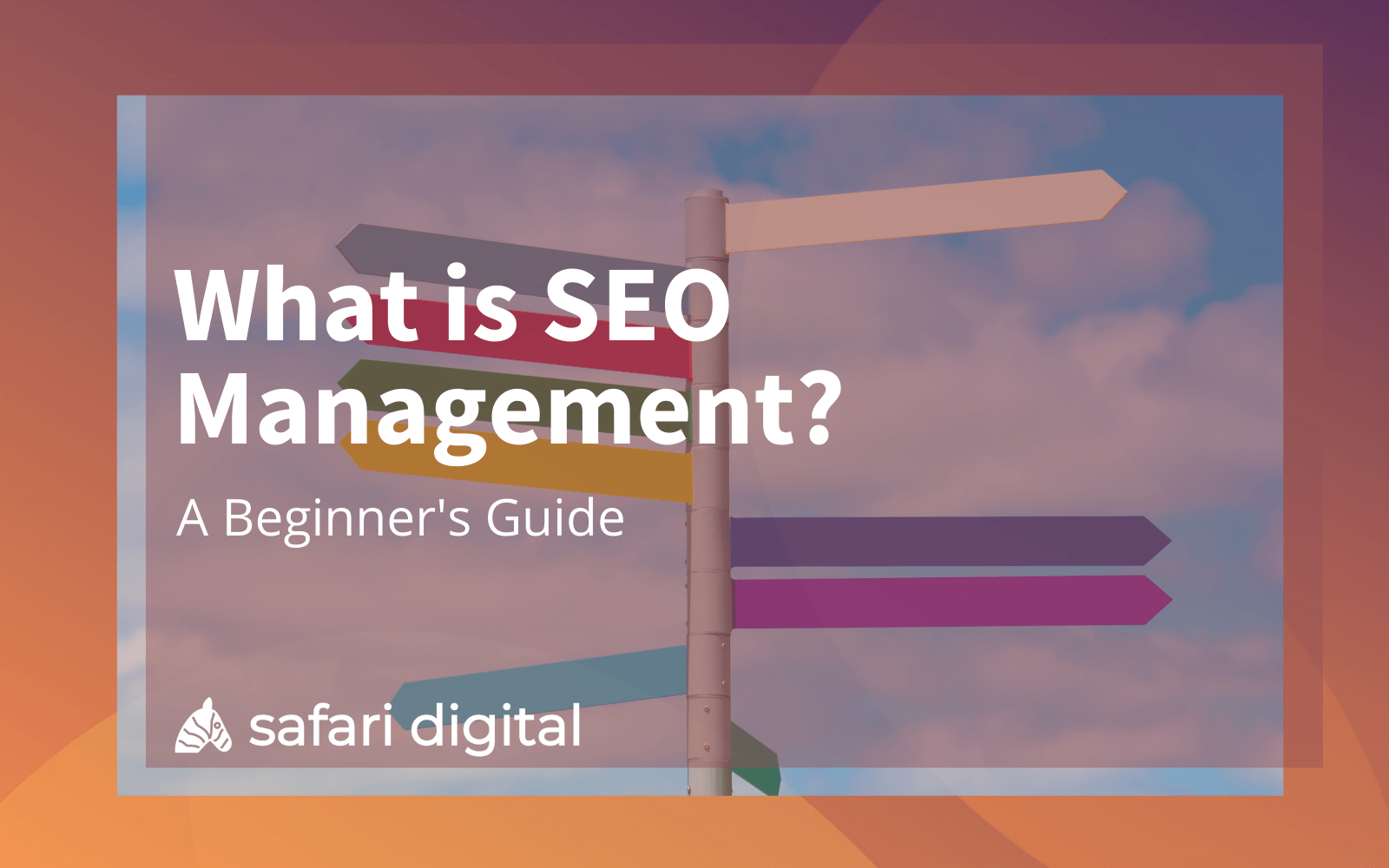
Search engine optimisation (SEO) is a highly effective way to attract relevant, high-converting leads from customers that are actively seeking out the goods or services on a website.
SEO utilises search engines like Google, Bing, and Yahoo to organically build website traffic and provide a sustainable, long-term source of leads that can be used to drive business goals and build overall brand awareness.
Whether you choose to keep it in-house, or outsource to an SEO Agency, SEO management plays an important role in building a business online. To understand the role of search engine optimisation management, and how these services can be used to improve your online visibility, we have created a quick guide that explains what is involved and what you should be looking for.
What Is SEO?
SEO or Search Engine Optimisation is a type of digital marketing designed to improve the organic search rankings of a website so that it appears at the top of the organic search results in search engines such as Google, Bing, and Yahoo. Typically, search engine optimisation will focus on the four pillars of SEO:
1. On-site SEO
2. Content
3. Off-site SEO
4. Technical SEO
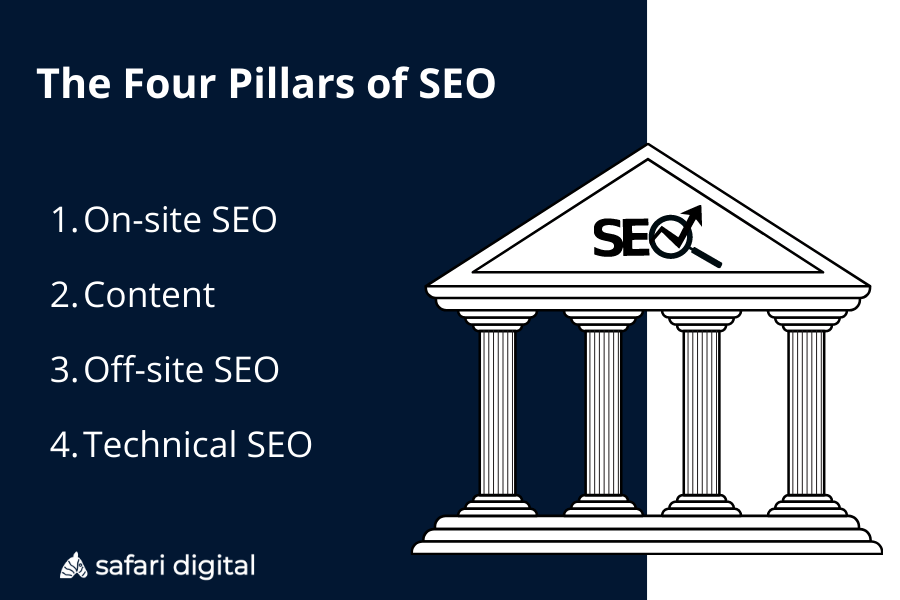
SEO is an inbound marketing strategy that targets users that are looking for a product or service. Unlike outbound digital marketing such as SEM or Social Media Ads, SEO provides valuable, relevant information as a user is searching for it. By improving the organic search rankings of a website, it can receive more organic traffic, which effectively increases the number of relevant business leads that it receives.
What is SEO Management?
SEO management refers to implementing on-site and off-site search engine optimisation strategies that affect the organic search visibility of a website. Generally, SEO management is carried out by an agency or consultant tasked with following best practice guidelines, delivering safe and sustainable SEO strategies, and implementing changes that align with the latest search algorithm updates.
In some cases, SEO is handled by an internal marketing team; however, given the specialised skills and knowledge that SEO requires, the task is often outsourced to an external company with specialised staff, knowledge, and the necessary tools. The most recent data suggests that around 54% of companies will pay an internal or external consultant for ongoing SEO management services.
What Does SEO Management Involve?
Improving your organic rankings and fighting your way to the top of Google’s search rankings requires a holistic approach. At Safari Digital, we take a repeatable, proven eight-step approach to SEO management services that focuses on the on-site and off-site factors that enable a website to rank at the top of the search results.
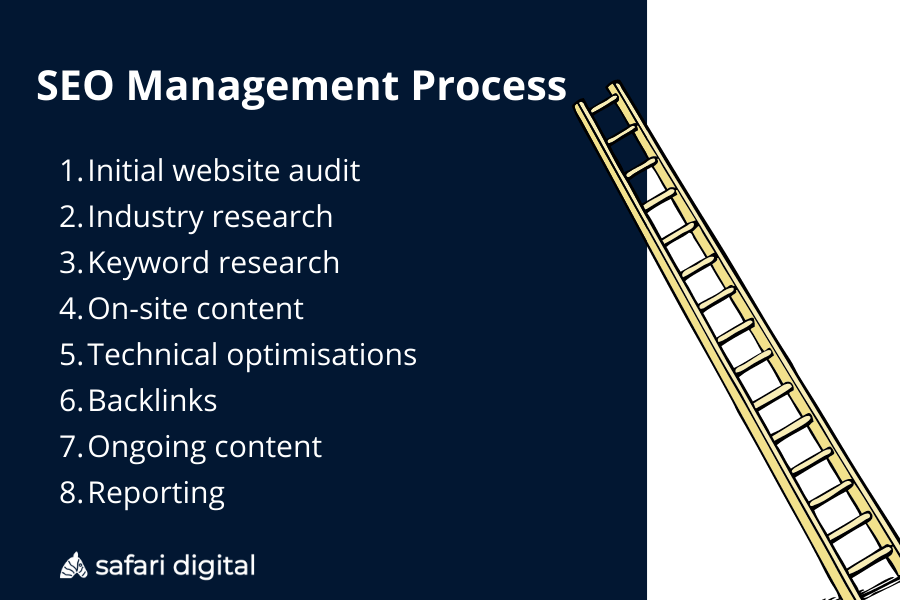
1. Initial website audit
Before devising an organic marketing strategy for a business, it is important to draw a line in the sand and establish a baseline or starting point. An initial website audit enables an SEO Agency to understand what is required to improve organic traffic. An initial website audit will examine current website metrics, current website traffic, website history, current keyword targeting, and placement within the market. The website audit is performed as part of an ‘SEO pitch’ to a prospective client in many cases. A standalone SEO audit service is sometimes offered, however, unless you have the in-house resources to implement the findings, the value can be limited.
2. Industry research
Each successful SEO campaign begins with comprehensive industry research that uncovers competitors and uses SEO to attract relevant users to their website. It’s essential to understand how the market operates and what key competitors are doing to win organic traffic. Using this information, it is possible to reverse engineer a strategy that utilises these insights to reduce the time and testing required to achieve SEO results.
3. Keyword research
Keyword research is (arguably) the most important step to delivering effective SEO management to clients. Keyword research involves understanding the difference between informational, navigational, and transactional search terms and looking at how different competitors target their market through SEO. Your SEO manager should be able to clearly articulate which page of the website will be used to target which search terms and understand critical keyword research terminologies such as keyword cannibalisation, density, and intent.
4. On-site content
According to the latest SEO statistics, around 50% of organic search rankings is determined by the strength of on-site content. On-site content pertains to the informational and transactional pages on a website that drive relevant, motivated traffic to a website. Keyword research is used to inform the direction of on-site content and mitigate common SEO mistakes such as keyword cannibalisation and over-optimisation.
5. Technical optimisations
Technical SEO is the process of ensuring website accessibility, crawlability, and usability to ensure websites can appear in search engines and provide a good on-site experience for website users. Generally, technical SEO is handled by a specialist with advanced technical abilities. Some of the elements that are addressed include URL structure, structured data, duplicate content, redirects, and sitemaps – to name a few.
6. Backlinks
Backlinks or external links act as a trust signal to search engines. If a high number of reputable websites link to a piece of content, search engines will infer that content is worth linking to and, therefore, worth showing at the top of search engines. At the time of writing, backlinks account for roughly 40% in the SEO ranking algorithm and play an indispensable role in ranking competitive key terms.
7. Content marketing
Content marketing is an essential ongoing element in successful SEO management. Closely tied to keyword research, content marketing is designed to attract high-quality traffic and bolster transactional landing pages on a website. Content marketing enables websites to diversify their web traffic and gain trust with search engines by effectively positioning themselves as thought leaders.
8. Reporting
Reporting is an essential element in effective SEO management. SEO reporting provides insights on key performance metrics such as competitor comparison performance, organic website clicks, organic website impressions, bounce rate, and growth over time. Reports are catered towards a unique set of KPIs that align with the SEO goals.
What Does On-Site SEO Management Involve?
On-page or on-site SEO management involves optimising web pages to appear at the top of search engines for a pre-determined set of keywords. Generally, on-page SEO is an ongoing process whereby a website will rollout ongoing content designed to target different keywords and search query types.
On-site SEO is sometimes lumped into the same category as ‘technical SEO’, which does not accurately depict the process. Generally, technical SEO issues are raised by an SEO professional and implemented with the help of a front-end or back-end web development specialist. Conversely, the process of on-page SEO is handled entirely by an SEO professional who will identify a strategy to target different informational and transactional search terms on a website.
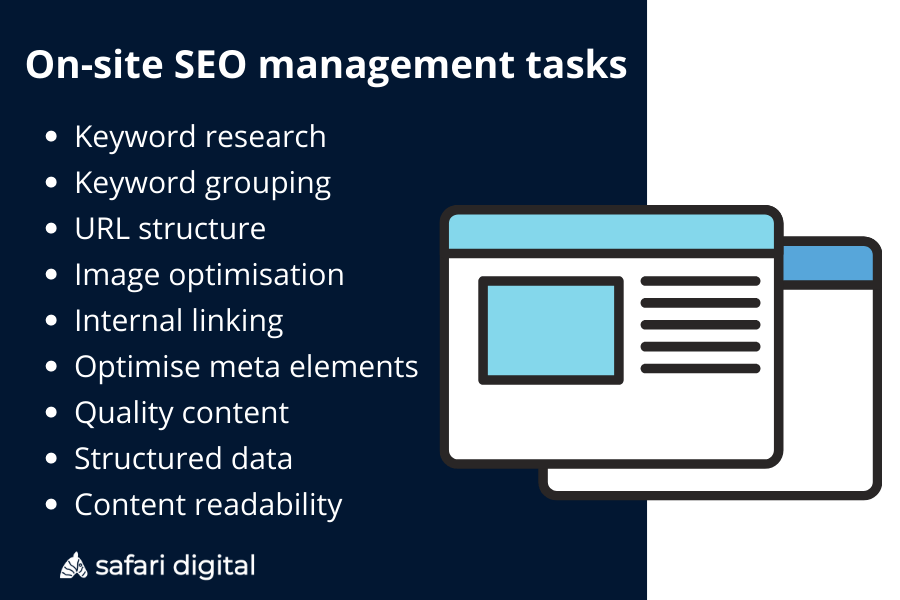
Some of the tasks for on-site SEO management include:
• Keyword research
• Keyword grouping
• URL structure
• Image optimisation
• Internal linking
• Optimise meta elements
• Quality content
• Structured data
• Content readability
What Does Off-Site SEO Management Involve?
Off-page or off-site SEO refers to all of the elements that impact search engine rankings from the website. Around 40% of how a website ranks in search engines is influenced by off-page factors that effectively build authority and trust within search engines. Backlinks or link-building are at the heart of off-site SEO and play a significant role in building trust and improving website rankings for competitive search terms. Essentially, each time a website receives a link, that link acts as a trust signal to search engines and implies that if the content is worth linking to, then it is worth showing in the top positions of search results.
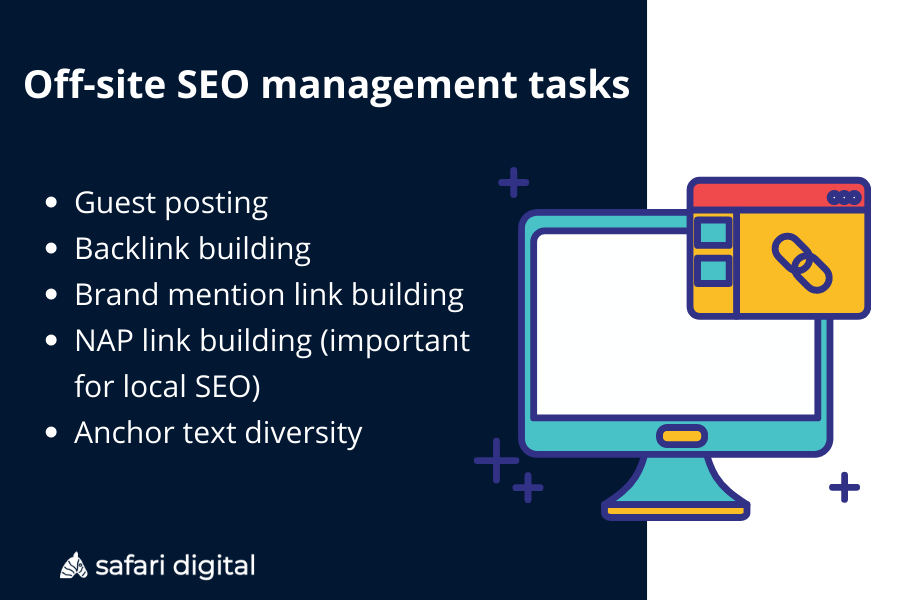
Some of the off-site SEO management tasks include:
• Guest posting
• Backlink building
• Brand mention link building
• NAP link building (important for local SEO)
• Anchor text diversity
Contrary to popular opinion, social media is not considered an element in off-site SEO management. While it is essential to maintain social media profiles that align with your website and your brand, this can be thought of as a separate, complementary task.
Do I Need SEO Management Services?
Search engine optimisation is the most effective way to target motivated visitors to your website when they are searching for the goods or services that you offer. Unlike traditional marketing channels that ‘disrupt’ a customer, SEO is about putting your business in front of interested customers at the time of purchase.
SEO is a cost-effective way to build website traffic at scale and reduces the dependence on paid marketing channels such as SEM or social media marketing. For a business that relies on their online presence to build awareness, make sales, and attract enquiries, SEO management is an essential tool in a holistic digital marketing strategy.







